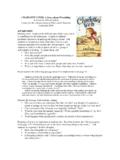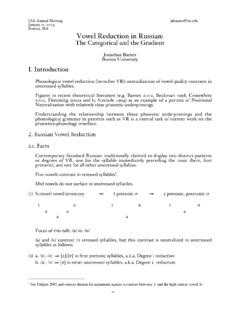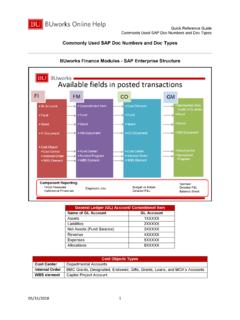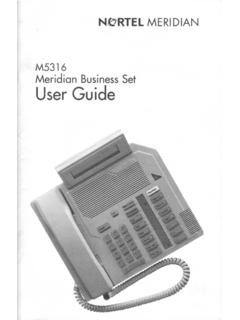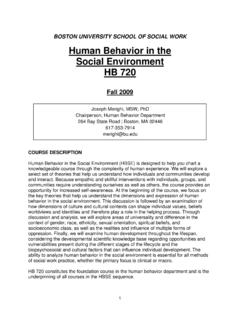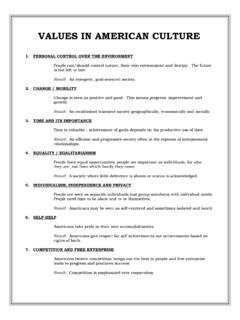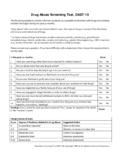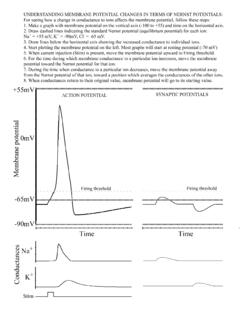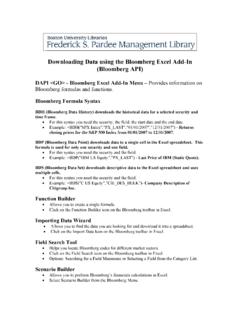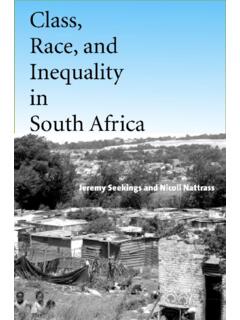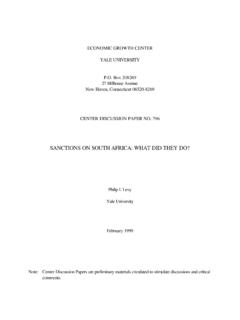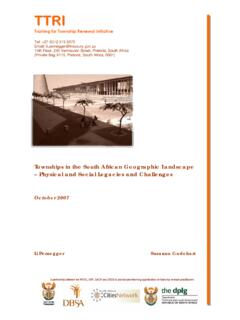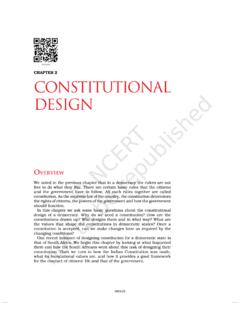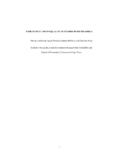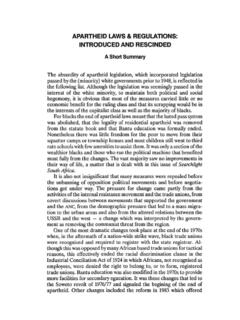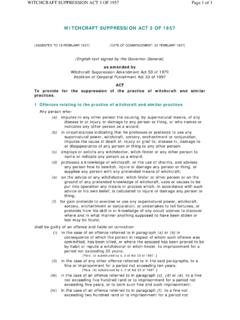Transcription of South African Short Stories: Apartheid, Civil Rights, and You
1 South African Short Stories: apartheid , Civil Rights, and You Ms. Carol Marshall Hingham Public Schools Prepared for Primary Source Summer Institute: Modern African History: Colonialism, Independence, and Legacies (2015). Carol Marshall, Hingham Public Schools Abstract: The legacy of Western colonialism in African history can be seen in much of the South African literature, and specifically through stories that deal with apartheid . apartheid - Literally apartness in Afrikaans. A policy of racial segregation introduced by the National Party after its electoral victory in 1948. It created a highly stratified society in which whites dominated politically, economically, and socially at the expense of blacks. These lesson plans will not only introduce students to a diverse group of South African writers and literature, but they will also help students to begin to understand, in a personal way, how apartheid created discriminatory and despicable laws, boundaries, and limitations for those who lived in South Africa during this time period.
2 In these stories, the student will be introduced to characters ranging from the British colonialist and his family, to the Afrikaner, to black children and their families whose home is South Africa, to coloureds (a designation by the white-ruling Nationalist party as a term for mixed races), and to a small population of Indians. Additionally, students will explore through a lesson plan on the Little Rock Nine, how race in America impacted citizens here in a profound way, proving that the legacy of colonialism is the history of every African American citizen living today and a challenge for every single citizen of the United States to overcome. When these lesson plans are introduced, students will have just finished a key text by Chinua Achebe, Things Fall Apart, published in 1958, through which students learn how colonialism impacted the Ibo of Nigeria during the late 1800's and early 1900's.
3 The Short stories will provide additional, diverse perspectives and highly compelling views of the legacy of colonialism and later apartheid . Africa is not one story ; on a continent with over 50 nations, one unit can only hope to showcase a selection of voices. Still, the use of authentic voices from another country in Africa beyond Nigeria will allow students to engage with multiple voices and perspectives relating to diverse, authentic, and specific concerns, dreams, and challenges in a particular time and place.. Modern African literature is an astonishing and vibrant body of work, produced in multiple languages and from every part of the continent, including memoir, oral literature, poetry, Short fiction, novels and more. (from Primary Source course materials - ). Unit one of the World Literature curriculum for 10th grade begins with Things Fall Apart by author Chinua Achebe, published in 1958 and recognized as a modern classic of pre-colonial and post-colonial Africa in the country later called Nigeria.
4 It is an 2. Carol Marshall, Hingham Public Schools effective way for students to begin their formal study of the 10th grade World Literature course because the text introduces students to many of the topics that students will examine critically throughout the year gender, race, religion, class, language, ancestry, diversity, culture, prejudice, tolerance, stereotypes, and more surrounding one's identity. This specific series of lesson plans relating to African Short stories will be a significant addition to the text Things Fall Apart, by Chinua Achebe because it will expand students' knowledge of yet another region of Africa ( South Africa), broaden their knowledge of authentic African voices, and deepen their understanding of a key time period/governmental policy in South Africa known as apartheid , which they also learn about concurrently in their World History course.
5 Some of the Short stories I selected were introduced to me at the Primary Source course on Modern African History: Colonialism, Independence and Legacies. Others I selected from further independent research, often a result of a name or resource provided to me during the course. I selected the stories based on their accessibility to teens, the diversity of South African authors, and the many and varied character perspectives. The stories challenge the colonizers'. racial assumptions and claims to cultural superiority and reveal social and economic exploitation through the late 1900's (well beyond the time period covered in Achebe's novel). Each of these selected Short stories from South African writers help students explore and grapple with the European assumptions that says one group/race (European). is superior to another ( African ). The western legacy of colonialism still impacts students in the way they perceive themselves, South Africans, and the world around them.
6 The lessons have been designed to help students understand how race, class, and gender roles, as well as other cultural parameters, are often artificially created or socially constructed and yet impact all cultures. This unit is also situated prior to the World Literature Holocaust unit (which comes later in the year), in which the European Jewish people were exploited and subjugated by Nazi Germany. Many students will see parallels between the Jewish people in Europe during the 1930's-1940's and the blacks' situation in South Africa throughout the 1900's, so these Short stories will provide significant context for the Holocaust unit. This unit will also help students to understand the need to right the wrongs of colonialism (of which there is still a legacy) and empower them to go forward in a way that doesn't repeat oppressive history. The Civil Rights era in the United States itself is mired in inequality arising from the history of slavery, tying in again with the history of Africa and imperialist attitudes.
7 Black Lives Matter, a current grass roots movement and mantra emerging now on the 2015 political scene will be a highly relevant issue in 2016 presidential election, as racial intolerance has been a dominant factor in many recent news stories in which white (policemen) have abused power in many cases with black victims, both men and women. Significantly for the English Language Arts frameworks, in this unit students will read critically, cite textual evidence, determine themes, expand vocabulary, present arguments, discuss texts using the Socratic method of inquiry, and write critically using well-structured forms with supporting evidence and write creatively and empathetically using a variety of forms (narratives, poetry, Short stories, etc.). 3. Carol Marshall, Hingham Public Schools Length of Unit This Short story unit, comprised of (currently) about 7 Short stories (most of which are in a collection of Short stories called Somehow Tenderness Survives: Stories of Southern Africa), can be used by any English teacher as a stand-alone Short story unit, or as a supplement to a key text.
8 These lessons, if used in their entirety, would take approximately three weeks to complete; however, if time does not allow this, teachers may select from the individual lesson plans outlined in this paper, most of which can be used independently from the others. Also, while I have selected Short stories and arranged the unit in scope and sequence to build on prior themes, there is no absolute order required. However, the stories do seem naturally to follow the text Things Fall Apart, contextually and chronologically. One caveat: while my enthusiasm for this unit grew, I. added more Short stories and lesson plans. Realistically, I probably will have to pick and choose from these stories myself, if I also plan to teach the novel Things Fall Apart;. otherwise the Africa unit will be too long. I may substitute the Short stories for the novel for my honors or for my college prep sections (either/or), if I can get the book, Somehow Tenderness Survives: Stories of Southern Africa, for my students.
9 I think it may be out of print, as I couldn't order it from my local Barnes and Noble bookstore and had to purchase it on Amazon. Age of Students Students are about 15 years old when they enter 10th grade in September. At this time of the year, students are more concrete in their thinking and perceiving situations; by the end of the year when most are 16, they become more aware of the subtleties, nuances, and perspectives of people's stories. Helping students become more aware of the gray areas, and, ultimately, places where reconciliation can occur, is one of the goals of the course. Essential Questions Following are Essential Questions from the current World Literature curriculum which students address with each unit. These will also be applicable to the African Short stories. 1. What can a book teach about the many dimensions of global culture at a particular time and place?
10 2. How do important historical or political shifts affect the lives of the people in a culture or society? 3. What character traits are considered noble, heroic, or admirable in a particular culture or society? 4. How does fitting in or clashing with the cultural values of a society affect the individual? 5. What does reading about the culture and society of a different global area teach you about your own culture and society? 6. What is my role and purpose in a global community? 4. Carol Marshall, Hingham Public Schools In addition to the above questions, a postcolonial critic* uses some of the following questions to guide his or her analysis of a text. These essential questions are relevant as well to the Short story unit. *Postcolonialism's major concern is highlighting the struggle that occurs when one culture is dominated by another.
